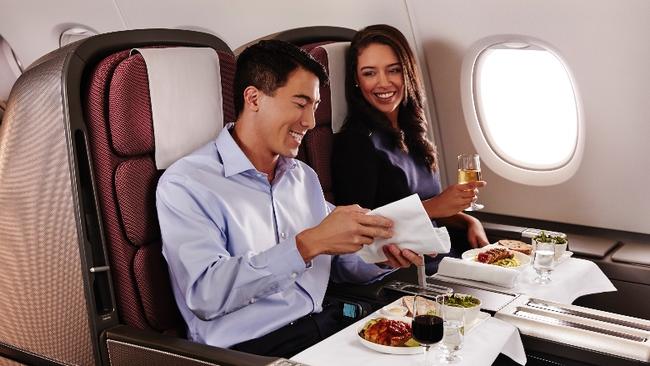
The experience was “surprisingly good,” I told a group of well-travelled Qantas Platinum status friends.
“My own suite, great food, half the price of Qantas.” All were interested until one asked whether you could earn Qantas Frequent Flyer Status Credits, and I had to say no.
Such is the power of Qantas’s loyalty program.
The Australian addiction to earning and retaining Platinum and beyond is a thing of wonder to other airlines around the world. People will pay significantly more to fly on Qantas – particularly if from the corporate or taxpayer’s wallet – just for the exclusivity of being in the club (and no, not the tin horn Qantas Club).
Its offering is compelling. When flying international, Platinum, Platinum One and Chairman’s Lounge travellers get priority boarding, and use of the Qantas First Class lounge, with food from a special Neil Perry menu, champagne to the brim and even complimentary LaGaia spa treatments at Sydney and Melbourne lounges.
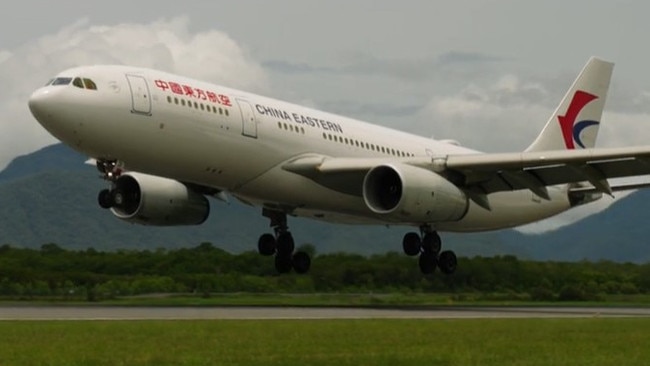
They get many of the same perks with Oneworld-aligned lounges across the world. Also on offer: better upgrades, faster phone customer service, and first in line offers for reward flights.
But could there finally be a proper rival to break the dominance of the Flying Kangaroo?
If Qatar’s plan to buy a quarter of Virgin Australia is approved by the Australian government, the all-powerful Avios program could become a significant part of the landscape.
The Avios points program is owned by International Airline Group (IAG), which owns British Airways, Iberia, Vueling and Aer Lingus.
The points program is also used by Qatar – which itself owns just over a quarter of IAG – and is also used by Finnair. The loyalty group is in talks to sign on other airlines.
By being a member of any of those airlines’ loyalty programs Australians have already been able to earn and burn Avios points offshore, but the attraction has been weak due to a lack of domestic network.
Neither Qatar nor Virgin would answer questions about whether the Australian airline’s reward points would shift over to Avios if the takeover deal is approved.
It would certainly make sense.
The way the scheme works for airlines like BA is that its members earn Avios points from flying with BA and its Oneworld partners as well as a range of other purchases, such as Uber rides (in much the same way as Qantas customers earn QFF points). These points can be shared and can be used to purchase flights and other products.
Then BA has a tier points system known as Executive Club (which is similar to Qantas’ Tier Status) whereby passengers can only earn points from flying and these points – which expire each year – cannot be spent or exchanged. These points determine which lounge you sit in and whether you are emerald ruby or sapphire.
As it currently stands in Australia, Virgin’s Velocity program has nowhere near the clout of QFF because of the simple fact that it lacks a decent international network. Adding Avios would completely change that dynamic.
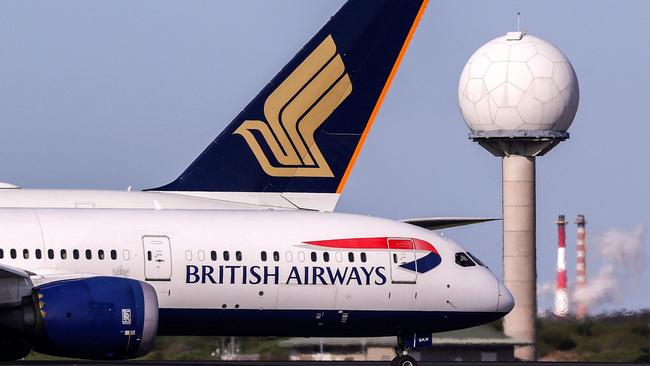
“Qantas frequent flyer program is still the more dominant one,” says Point Hacks editor Daniel Sciberras. “Velocity is not part of any global alliances yet. By that, I mean like Oneworld, Star Alliance or SkyTeam.”
Qantas was a founding member of Oneworld. It’s the smallest of the three main alliances, with 11.9 per cent market share. Star Alliance is the largest on 17.4 per cent followed by SkyTeam on 13.7 per cent, according to data from Statista.
Sciberras describes Oneworld as “very important,” to Qantas.
“Especially if you’re a business flyer,” Sciberras says. “You want consistency of products if you’re travelling around the world so you have to rely on one of the Oneworld partners. You want to know that you’re going to get lounge access and you’re going to get that priority baggage, priority check in, etc. Not to say Velocity’s international partners are bad, but there is definitely an inconsistency in product.
He cites the fact that with Virgin’s partner Air Canada, Velocity members only get lounge access, whereas with Virgin partner ANA, Velocity members get priority check-in and priority boarding.
“It’s all a bit inconsistent,” says Sciberras. “So I think that’s incredibly important to be in an alliance, at least for Qantas and the demographic they’re targeting.”
Which leads to perhaps the biggest elephant in the room: How secure is Qantas’ place in
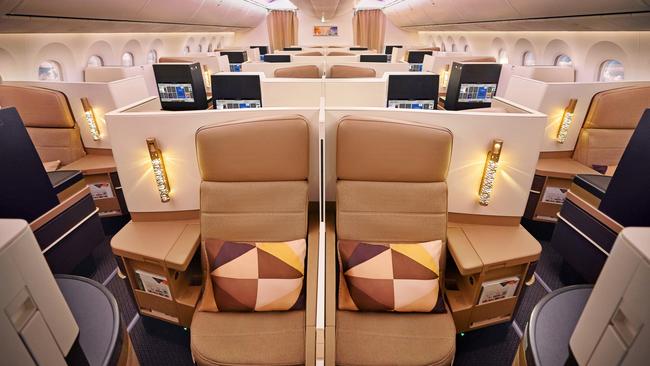
Oneworld if the Qatar deal to buy a quarter of Virgin is approved?
Qantas has a lot of sway with Oneworld as a founding member but ultimately when it comes to voting on Oneworld issues, fellow Oneworld member Qatar accounts for dramatically more of the alliance’s available seat kilometres (ASKs) on both its own metal and through its part ownership of IAG.
And lets not forget there is no love lost between Qantas and Qatar despite them currently being both members of Oneworld.
The federal government blocked Qatar from increasing services to Australia in 2023 after intense lobbying from Qantas under former chief executive Alan Joyce.
And it wasn’t Joyce’s first ride at the rodeo. His efforts were also successful in 2018, triggering a threat by Qatar to leave Oneworld because – among other reasons – Qantas had not acted “in the spirit” of the supposedly cosy alliance by lobbying against it in Australia.
The outspoken Irishman had more than a touch of smug about him when he told the South China Morning Post after that 2018 threat, that “nobody should be in an alliance where they believe it’s not working for them”.
Since then, both Joyce and Qatar’s CEO at the time have departed the cockpit.
It’s not yet clear what Hudson’s style with aviation peers will be, although she so far shows a more “disagree agreeably” style than her former boss.
Investor Steve Johnson from Forager Funds says the alliance is important to Qantas.
“Oneworld is critical to Qantas,” says Johnson. “I channel a lot of my travel toward flying with Oneworld because of the lounges and the status credits. It would have a big impact.”
As for whether Avios could knock the powerful Qantas Frequent Flyer program off its perch, Johnson is sceptical.
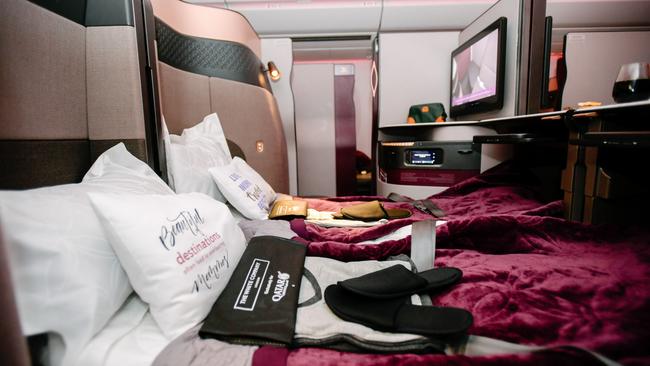
“I don’t think people will drop what they already have, but they might decide to have two programs.”
There are more than 40 million people collecting Avios points, so the London-based company certainly has scale over Qantas which has 16 million QFF members.
BA recently started Avios-only flights, which are only available through points redemption.
But for Qantas it has the strength of a 52-lounge network, with First lounges in Sydney, Melbourne, Auckland, Singapore and Los Angeles. In 2023, it announced a $100m upgrade to its global lounge network, including a new Adelaide lounge precinct (with a Business lounge for the first time), new Auckland International lounge precinct and a new Broome Regional lounge.
Hudson knows she needs to treat her top-tier passengers like stars. The arrival of Qatar makes that all the more important.




I recently took a last-minute trip to London flying with the airline China Eastern.